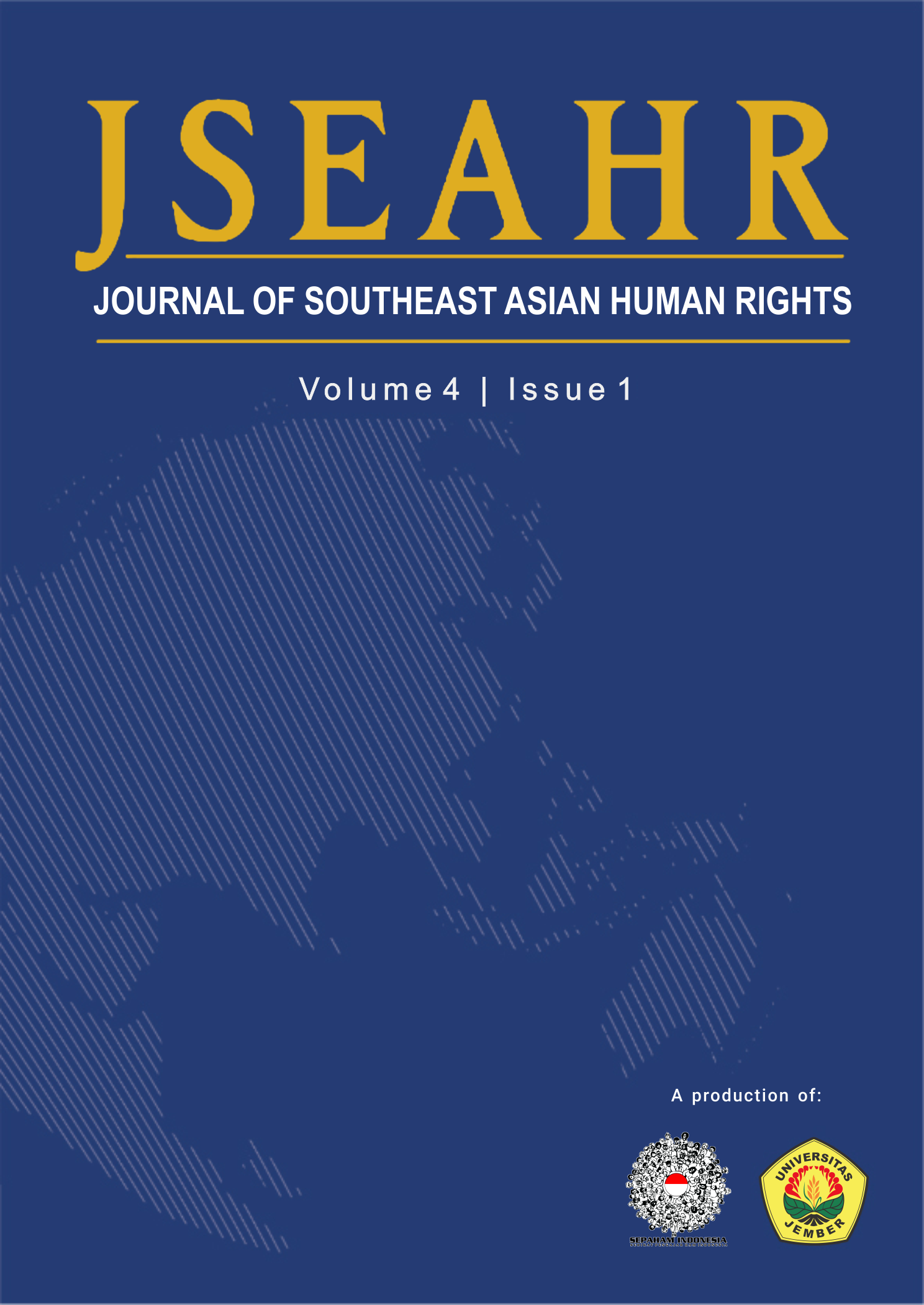Post-legislative Scrutiny (PLS) in the Process of Democratic Transition in Malaysia
DOI:
https://doi.org/10.19184/jseahr.v4i1.13591Abstract
Malaysia’s 14th general election in 2018 saw the fall of the Barisan Nasional (BN) regime after ruling the country for more than six decades. Prior to the election, Malaysia faced challenges ranging from the absence of state legitimacy, fragile institutions to corruption scandals, leaving little room to have robust discourse on legislative reforms. Promise 16 of the Pakatan Harapan (PH) election manifesto prior to the election, pledges to restore the dignity of Parliament to institutionalize the select committee system in Parliament and the Senate to enable them to function effectively. Whilst there is limited post-legislative scrutiny (PLS) in Malaysia for now, the various reforms in the phase of democratic transition to the administration of PH is a positive sign of the possibility for Malaysia to move into better law-making procedures. This paper examines the work that is currently being undertaken in the Parliament of Malaysia to assess whether the current parliamentary reforms can pave the way for the PLS mechanism to be put in place.
Downloads
References
Aris, Nurul Azwa, Senator wants Parliamentary Services Act restored for greater parliamentary autonomy, Free Malaysia Today (18 February 2019), online: <https://www.freemalaysiatoday.com/category/nation/2019/02/18/reforms-committee-chief-wants-parliamentary-services-act-1963-restored/>
Pakatan Harapan. (2018), online: Buku Harapan: rebuilding our nation, fulfilling our hopes. <http://pakatanharapan.com.my/diymanifesto>
Case, William, “Malaysia: The semi-democracy paradigm†(1993) 17:1 Asian Studies Review 75-82.
Casey Lee, Making Sense of Malaysia’s Institutional Reforms (ISEAS: Singapore, 2018).
Crouch, H. A, Government and society in Malaysia. (St Leonards: Allen and Unwin, 1996).
Dewan Negara rejects Bill to repeal Anti-Fake News Act, The Star (12 September 2018), online: <https://www.thestar.com.my/news/nation/2018/09/12/dewan-negara-rejects-bill-to-repeal-anti-fake-news-act/>
Economic Intelligence Unit (EIU). (2017), online: Democracy index 2017: Free speech under attack. <https://www.eiu.com/public/topical_report.aspx?campaignid=DemocracyIndex2017>
Enhancing parliamentary committees in Malaysia, Malaysian Economic Association (2017).
Faruqi, Shad Saleem. Proposals for parliamentary reforms, The Star (21 June 2018), online: < https://www.thestar.com.my/opinion/columnists/reflecting-on-the-law/2018/06/21/proposals-for-parliamentary-reforms-post-ge14-the-institutional-efficacy-of-our-elected-legislature/>
Faruqi, Shad Saleem. Restoring parliament’s eminence. The Star (14 April 2016), online: <https://www.thestar.com.my/opinion/columnists/reflecting-on-the-law/2016/04/14/restoring-parliaments-eminence-systems-in-which-people-participate-are-systems-they-are-likely-to-re/>
Ida Nadirah Ibrahim. PM’s question time part of parliament reform, says deputy speaker, The Malay Mail (11 May 2019), online: < https://www.malaymail.com/news/malaysia/2019/05/11/pms-question-time-part-of-parliament-reform-says-deputy-speaker/1751956>
Khoo Ying Hooi. A year after Malaysia changed government: a messy democracy but necessary, The Malay Mail Online (8 May 2019), online: <https://www.malaymail.com/news/what-you-think/2019/05/08/a-year-after-malaysia-changed-government-a-messy-democracy-but-necessary-kh/1751027>
Malaysia to keep death penalty, but no longer mandatory, Channel News Asia (13 March 2019), online: <https://www.channelnewsasia.com/news/asia/malaysia-death-penalty-not-completely-abolished-11340612>
Mauzy, D. K, “The challenge to democracy: Singapore’s and Malaysia’s resilient hybrid regimes†(2006) 2:2 Taiwan Journal of Democracy 47-68.
Means, Gordon. P, “Soft authoritarianism in Malaysia and Singapore†(1996) 7:4 Journal of Democracy 103-117.
Mohd Hishamudin Yunus, Parliamentary select committees in Legal Herald (December 2016), Lee Hishammuddin Allen & Gledhill, online: < https://www.lh-ag.com/wp-content/uploads/2017/01/7828_Legal-Heral-Dec_v3.pdf>
Parliament ‘too powerful’? Speaker to slow down reforms to help MPs adapt, Malaysiakini (26 April 2019), online: < https://www.malaysiakini.com/news/473799>
Sedition Act to be abolished, says Liew, The Star (10 May 2019), online: <https://www.thestar.com.my/news/nation/2019/05/10/sedition-act-to-be-abolished-says-liew/>
Six new standing committees as first step towards New Malaysia, The Star (5 December 2018), online: < https://www.thestar.com.my/news/nation/2018/12/05/six-new-standing-committees-as-first-step-towards-new-malaysia/>
Vijaindren, Audrey. Select committee, a positive progress in parliamentary reform, says C4, New Straits Times (8 August 2018), online: <https://www.nst.com.my/news/nation/2018/08/399440/select-committee-positive-progress-parliamentary-reform-says-c4>
Zakaria, Ahmad. “Malaysia: quasi democracy in a divided societyâ€. In Larry Diamond, Juan J. Linz and Seymour Martin Lipset (Eds.). Democracy in developing countries: Asia (Vol.3) (Boulder, CO: Lynne Rienner Publishers, 1989).







